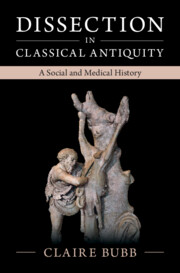Book contents
- Dissection in Classical Antiquity
- Dissection in Classical Antiquity
- Copyright page
- Contents
- Figures
- Acknowledgments
- A Note on Citations, Abbreviations, and Dates
- Chapter 1 Introduction
- Part I Practice
- Chapter 2 Dissection in the Classical and Hellenistic Periods
- Chapter 3 Dissection in the Roman Period
- Chapter 4 Practical Considerations of the Dissector
- Chapter 5 The Broader Social Contexts of Dissection
- Part II Text
- Works Cited
- Index
Chapter 5 - The Broader Social Contexts of Dissection
from Part I - Practice
Published online by Cambridge University Press: 18 November 2022
- Dissection in Classical Antiquity
- Dissection in Classical Antiquity
- Copyright page
- Contents
- Figures
- Acknowledgments
- A Note on Citations, Abbreviations, and Dates
- Chapter 1 Introduction
- Part I Practice
- Chapter 2 Dissection in the Classical and Hellenistic Periods
- Chapter 3 Dissection in the Roman Period
- Chapter 4 Practical Considerations of the Dissector
- Chapter 5 The Broader Social Contexts of Dissection
- Part II Text
- Works Cited
- Index
Summary
This chapter surveys the broader social contexts for dissection, in four sections: public performance, animals, religion, and popular conceptions of anatomy. The first section offers the context for public displays of dissection, namely competing types of performance, including sophistic lectures, legal proceedings, and the general spectacle of the streets. The second focuses on animals and the various circumstances outside scientific dissection in which bodies were cut into and opened, with specific attention on butchery, veterinary practice, pharmacology, magic, and staged animal shows in the arena. The third turns to religious contexts, encompassing the practices of animal sacrifice and divination from entrails, as well as the Italic votive tradition, which included artistic representations of various internal organs, and the Egyptian practice of embalmment. Finally, there is a sketch of popular experience with and conceptions of bodily rupture and anatomy, ranging from postmortem punishments, public executions and gladiatorial displays in the arena, and military violence to literary descriptions of gore, artistic depictions of bodies, and intellectual engagement with anatomy.
Information
- Type
- Chapter
- Information
- Dissection in Classical AntiquityA Social and Medical History, pp. 140 - 166Publisher: Cambridge University PressPrint publication year: 2022
